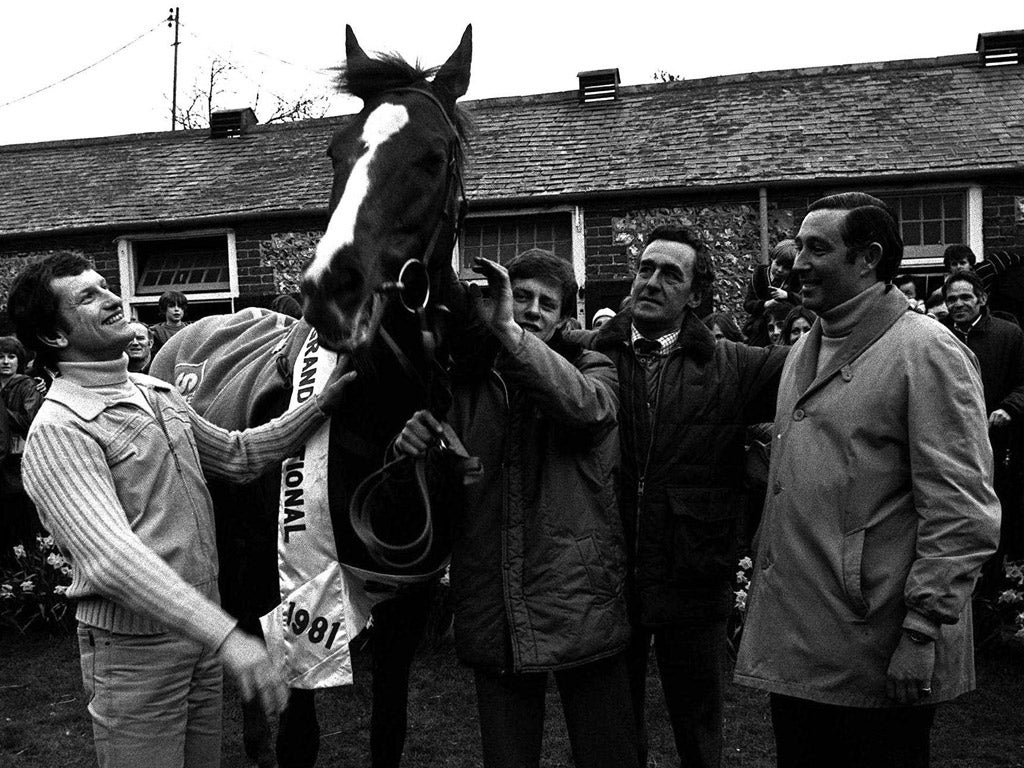Josh Gifford: Jockey and trainer best known for Aldaniti's 1981 Grand National victory

Your support helps us to tell the story
From reproductive rights to climate change to Big Tech, The Independent is on the ground when the story is developing. Whether it's investigating the financials of Elon Musk's pro-Trump PAC or producing our latest documentary, 'The A Word', which shines a light on the American women fighting for reproductive rights, we know how important it is to parse out the facts from the messaging.
At such a critical moment in US history, we need reporters on the ground. Your donation allows us to keep sending journalists to speak to both sides of the story.
The Independent is trusted by Americans across the entire political spectrum. And unlike many other quality news outlets, we choose not to lock Americans out of our reporting and analysis with paywalls. We believe quality journalism should be available to everyone, paid for by those who can afford it.
Your support makes all the difference.Josh Gifford, who died yesterday of a heart attack at the age of 70, will be forever remembered for training Aldaniti to victory in the Grand National in 1981, a win which famously came after his jockey, Bob Champion, had recovered from cancer. After a successful career as a jockey himself, both in National Hunt and on the Flat, Gifford went on to train more than 1,500 winners. He was champion jockey on four occasions and finished second in the 1967 Grand National on Honey End behind the legendary winner Foinavon.
Joshua Thomas Gifford was born in Huntingdon in 1941, the son of a farmer and point-to-point enthusiast. He had his first ride as a 12-year-old, his first winner coming in 1956 on Trentham Boy. Becoming too heavy for Flat racing he switched to the jumps; his first winner was at Wincanton in 1959.
In all he won 641 times, including a string of big victories for the trainer Ryan Price, from whose Findon yard he eventually trained himself. His riding career wasn't without controversy: in the first Tote Gold Trophy, at Newbury in 1964, Rosyth was the winner, but Price and Gifford were banned because of the horse's sudden improvement. In the same race three years later, Hill House tested positive for the steroid cortisol after Gifford had steered him to victory. An inquiry was to establish that Hill House produced the drug himself because of a metabolic imbalance, and he became known as "the horse who made his own dope".
In the 1967 Grand National Foinavon, ridden by John Buckingham, was a 100/1 outsider pootling around the course until a loose horse veered dramatically to the right at the 23rd fence, causing a pile-up that took out most of the field. Buckingham was able to steer round the chaos, and though Gifford, leading 17 remounted horses, brought Honey End to within 20 lengths, Foinavon held on.
When Price decided to switch to the Flat, Gifford took the racing world by surprise, quitting riding at the age of 28 to take over a top string of jumpers. In 1978 he won the Hennessy Cognac Gold Cup with Approaching, and the 1978 Christmas Hurdle with Kybo – arguably the best horse he trained – other top-quality horses included Door Latch, Deep Sensation, Bradbury Star – who won eight races at Cheltenham including the Mackeson Gold Cup twice – and Katabatic.
During his first 17 years as a trainer he failed to win a race at the Cheltenham Festival, but his wait ended in 1988 with three winners at the meeting, Golden Minstrel, Vodkatini and Pragada. Their victories helped to lift him into second place behind David Elsworth in the prize-money table; it was the closest he came to being champion trainer. It was also his best season in terms of wins, with 91.
But it was Aldaniti's win in the 1981 National for which he is best remembered. The horse had been out of racing for 14 months when he was reunited with Bob Champion, who had just recovered from cancer. Together they won the Whitbread Trial Chase at Ascot in the February, the prelude to the most inspiring victory in National history. Aldaniti nearly didn't make it past the first fence, landing too steeply and coming to his knees. But the pair held on. "He was a great jockey, a great trainer and a great man," Champion said yesterday. "He was so loyal to his jockeys."
The pair were featured in the film Champions that immortalised the story, Champion played by John Hurt, Gifford by Edward Woodward. "He wasn't totally happy about the way he was portrayed in the film," his son Nick recalled. "Dad would say, 'I wouldn't walk into a ruddy hospital with my hat on, or drink champagne in the ward, or swear at owners'. Well, it was spiced up a bit, of course, but I thought it was a fairly good likeness."
In his last few seasons his fortunes waned and he retired in April 2003, handing over The Downs stables to his son, Nick. Gifford's daughter, Kristina Cook, meanwhile, won two eventing bronze medals at the 2008 Beijing Olympic Games, in the team and individual events.
Chris Maume
Joshua Thomas Gifford, jockey and trainer: born Huntingdon 3 August 1941; MBE 1989; married 1969 Althea Roger-Smith (one son, one daughter); died Findon, West Sussex 9 February 2012.
Join our commenting forum
Join thought-provoking conversations, follow other Independent readers and see their replies
Comments